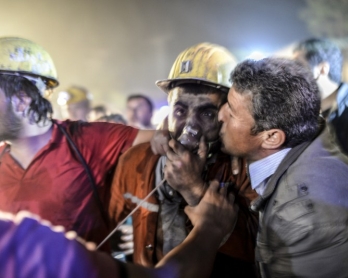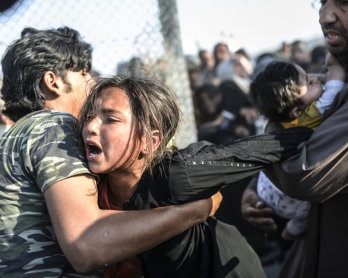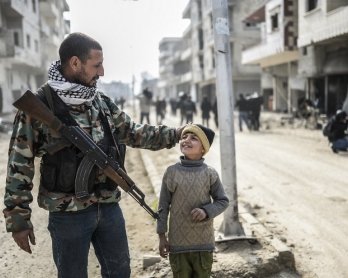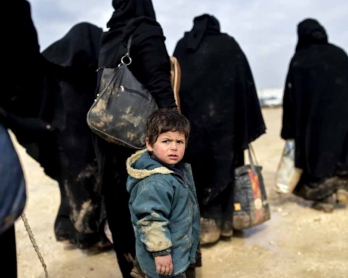Losing their minds
Idomeni, Greece, April 18, 2016 -- The striking thing about these refugees, the ones stuck for months on the Greece-Macedonia border, is that you can actually feel them slowly losing their minds.
I’ve covered this refugee crisis for years and in all sorts of places -- the refugees fleeing the war inside Syria, getting out of the war zone through barbed wire at the Turkish border, reaching European shores after dangerous journeys at sea on the Greek island of Lesbos. And now here in the Greek village of Indomeni, near the border with Macedonia.
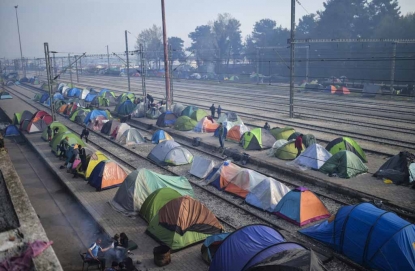 The tents that the migrants and refugees are living in on the rail tracks as they wait for the border to open. (AFP / Bulent Kilic)
The tents that the migrants and refugees are living in on the rail tracks as they wait for the border to open. (AFP / Bulent Kilic)There are around 11,000 people stuck here. This is the bottleneck that’s developed after a bunch of countries closed their borders in an effort to shut down the Balkan migrant route, through which thousands of people fleeing war and poverty in places like Syria, Iraq and Afghanistan have reached European countries over the past year or so.
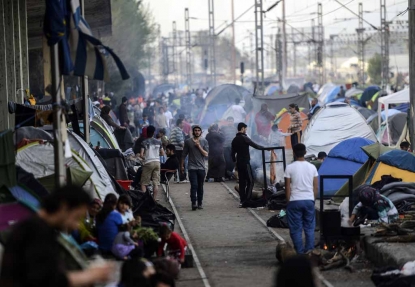 Life in the camp. (AFP / Bulent Kilic)
Life in the camp. (AFP / Bulent Kilic)Every place where I’ve covered the refugee crisis is different. What you have to understand about this place is the utter despair. These people have left war-torn countries, made dangerous journeys with their children in tow. And now they find themselves in the middle of Europe, living in conditions similar to what they left behind, with the gate to Europe shut and no idea of what will happen to them next.
Some of them have been here for two, three months. Just waiting. And not knowing what will happen next. Will they be able to get into Europe, like the thousands before them? Are they going to be sent back to Turkey? Are they going to have to go back to their countries?
So they’re losing their minds. What do you expect? You’d do the same in their situation. Day by day their behavior changes. Even me. I’m just doing my job, I’m used to these situations, having covered so many of them. During the two weeks I was there, I knew I was only going to be there temporarily, and then I would return to my home and family. And even me, day by day I became more depressed, more aggressive.
The atmosphere of the camp, it doesn’t just hang over you, it weighs you down. It’s heavy.
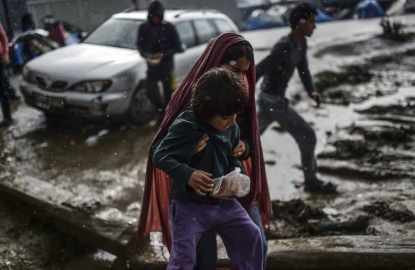 Making their way through the muddy camp. (AFP / Bulent Kilic)
Making their way through the muddy camp. (AFP / Bulent Kilic)And then there are the conditions. God, the conditions these people live in, I don’t even know what words to use to describe them. They’re the same conditions that you had in camps in Syria. And Syria has been in the middle of a war for the past five years.
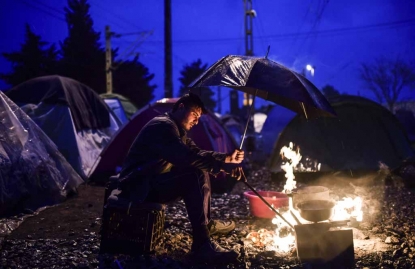 A man cooks over over a campfire in the rain. (AFP / Bulent Kilic)
A man cooks over over a campfire in the rain. (AFP / Bulent Kilic)The first thing that strikes you is the smell. A mixture of toilets and body odor.
People are living, sleeping and eating near the toilets. You could say they’re living, sleeping and eating in the middle of toilets. What else can I say? That should tell you everything. There aren’t enough showers, there aren’t enough places to wash your hands. There isn’t enough water, period.
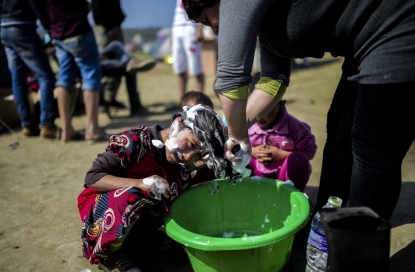 A mother washes her daughter's hair in a bucket at the camp. (AFP / Bulent Kilic)
A mother washes her daughter's hair in a bucket at the camp. (AFP / Bulent Kilic)The whole place is just not hygienic.
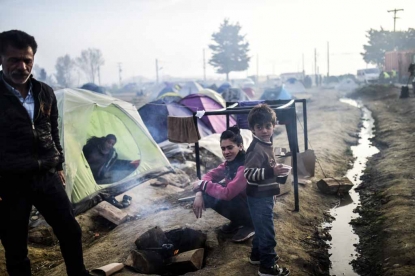 Daily life in the makeshift camp. (AFP / Bulent Kilic)
Daily life in the makeshift camp. (AFP / Bulent Kilic)The smell -- no, the stench -- is heavy and it’s everywhere. Children get sick. I have seen such conditions in war zones. And now I was seeing such conditions in the middle of Europe. This is the shame of Europe. These people are living like livestock -- and I don’t say that with any disrespect to them -- they’re living like they’re still inside Syria and they’re in the middle of Europe.
And then there is their daily life. If you could call it that. They go from food line to food line, eating food given to them by NGOs.
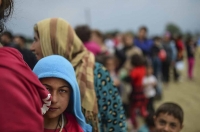
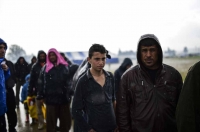
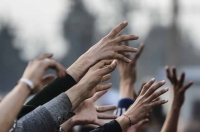
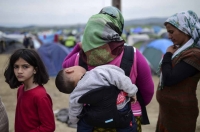
There is nothing to do but to take care of their basic needs. And wait. Can you imagine? Having literally nothing to do all day, except to watch your dreams and hopes slowly die, despite all the sacrifices you made to get to this point. And just not knowing what will happen next.
These people, they have spent lots of money and time, they took lots of risks to get here, they have spent their life savings. They don’t want to go back. First off, there is nothing to go back to and secondly, then what was it all for?
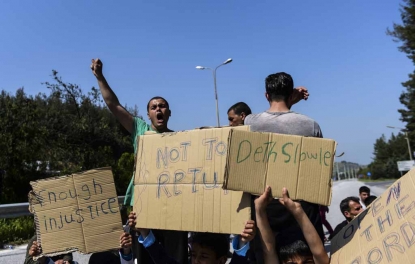 Refugees and migrants hold up signs pleading to be let through to Europe at a police roadblock in April, 2016. (AFP / Bulent Kilic)
Refugees and migrants hold up signs pleading to be let through to Europe at a police roadblock in April, 2016. (AFP / Bulent Kilic)As a journalist, it’s also difficult because people look at you as some kind of savior. Every day people ask me, “When are they going to open the gate?” “What will happen to us?” I have no idea what to tell them. I just don’t know.
You want to know what life is like inside? I have a friend, a Kurdish woman from Syria whose husband went to Europe six months ago. He’s in Germany now and he has sent for her and their two children. She travelled through Syria and she has been at the border for two months, waiting to go to Germany and join her husband.
She goes to the food lines and people there, they start hitting each other and pushing each other to get the food.
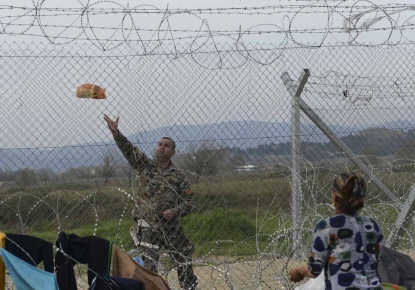 A Macedonian soldier throws bread over a barbed wire fence to a Syrian refugee woman. (AFP / Bulent Kilic)
A Macedonian soldier throws bread over a barbed wire fence to a Syrian refugee woman. (AFP / Bulent Kilic)She tells me ‘I have never hit anyone in my life to get food, I just can’t do it. Even here, I just can’t do it. How can I push another person to get food?” So there have been days when she just couldn’t get any food. This is how people live in the camps.
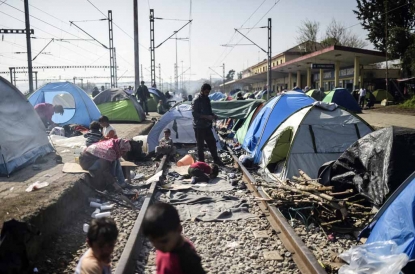 Daily life at the camp. (AFP / Bulent Kilic)
Daily life at the camp. (AFP / Bulent Kilic)And then there are the children. The children are what gets to you the most in this story. They’re the ones that stay in your mind once you go home. Especially if you have kids of your own.
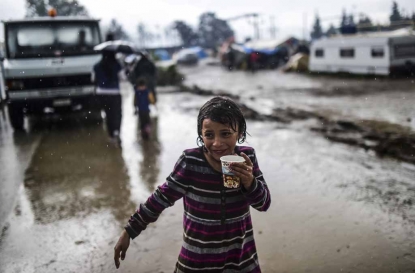 A girl walks under the rain through the muddy camp. (AFP / Bulent Kilic)
A girl walks under the rain through the muddy camp. (AFP / Bulent Kilic)The children, they’re just going crazy in these camps. They don’t go to school. Do you know what happens to children if they don’t go to school? The way they act changes. You can actually feel their brains changing.
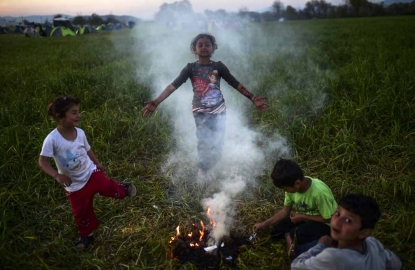 Children play around a campfire that they started in the camp. (AFP / Bulent Kilic)
Children play around a campfire that they started in the camp. (AFP / Bulent Kilic)They play in the middle of the train tracks, in mud. They have nothing to do. They come and touch you, they push you, they shout at you. What do you expect?
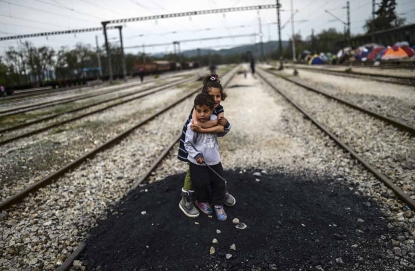 Children play on the train tracks. (AFP / Bulent Kilic)
Children play on the train tracks. (AFP / Bulent Kilic)My friend, she has an 8-year-old boy and a 14-year-old girl. Because of the war, they haven’t been to school in two or three years. She is really worried about them. They don’t learn anything, she says, what’s going to become of them?
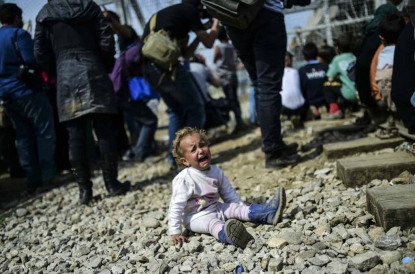 A child cries as migrants and refugees clash with riot police. (AFP / Bulent Kilic)
A child cries as migrants and refugees clash with riot police. (AFP / Bulent Kilic)And to top it all off, you had the tear gas incident of a week ago. You had a bunch of people trying to force their way through the closed border into Macedonia, and the soldiers threw tear gas canisters and fired rubber bullets, injuring several dozen people who were then treated by NGOs.
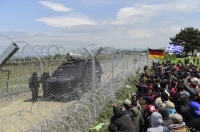
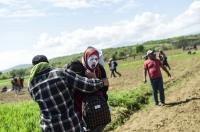
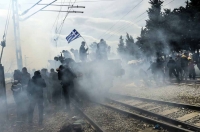
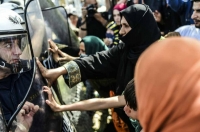
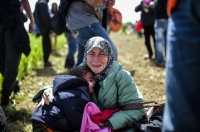
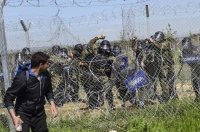
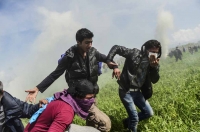
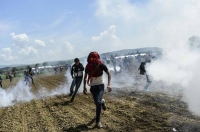
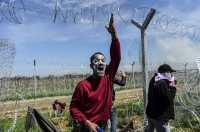
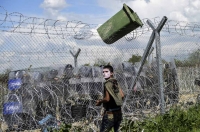
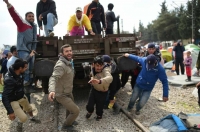
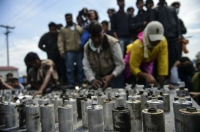
Can you imagine? You’ve been through hell, you’re living in hellish conditions, you have no idea of what’s going to happen to you and then you have soldiers throwing tear gas at you.
It’s just crazy. Who wouldn’t lose their mind?
This blog was written with Yana Dlugy in Paris.
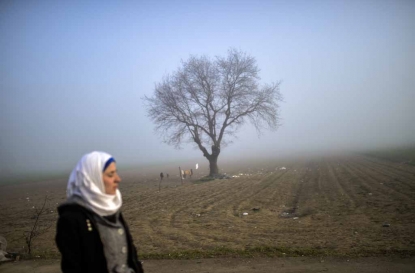 A woman walks in the morning as she waits for food distribution at the camp. (AFP / Bulent Kilic)
A woman walks in the morning as she waits for food distribution at the camp. (AFP / Bulent Kilic)



